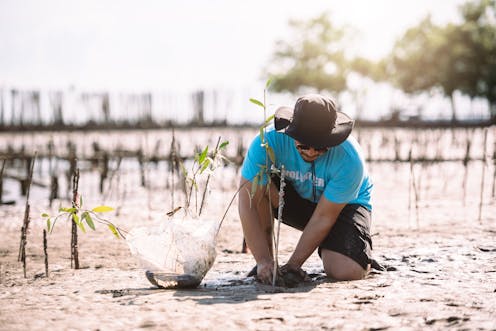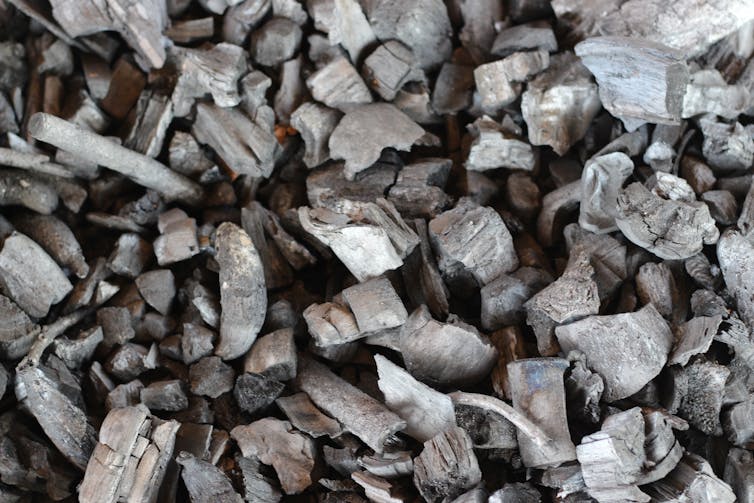Five ways to improve the global voluntary carbon credit markets
Carbon credits aren’t inherently bad – the system needs greater transparency and better monitoring to ensure credibility.

The severity of climate change means we all need to reduce our carbon footprint to zero as quick as possible, including companies. The voluntary carbon markets were set up to allow companies to buy and sell carbon credits to offset their emissions.
A carbon credit is a promise to the purchaser that their greenhouse gas emissions will be offset in the future by the same amount. This could be by avoiding emissions elsewhere or extracting the same amount from the atmosphere.
The voluntary carbon markets already channel US$2 billion (£1.57 billion) a year through their systems. This could grow tenfold over the next decade. But many companies have been accused of greenwashing as they are using carbon credits to avoid reducing their own emissions. And many of the projects creating credits have been accused of failing to produce real reductions in carbon emissions.
I am a founding member of the Climate Crisis Advisory Group (CCAG) and led their latest report on the voluntary carbon markets. Together with the CCAG’s international climate experts, I agree with the White House’s recent report that voluntary carbon markets are a small but essential part of worldwide efforts to reduce global emissions. Scientific research shows that all the major approaches to creating carbon credits work – if done properly.
There are two main ways to create a carbon credit. First, there are projects that avoid emissions, such as renewable energy, energy efficiency, avoiding deforestation or protecting wetlands and ocean ecosystems.
Second, there is removal and storage of carbon dioxide from the atmosphere by methods including reforestation, biochar or direct air capture. Reforestation seems sensible but care has to be taken to use the appropriate trees in the right location and forests need to be managed and maintained for decades to ensure they survive.
Biochar is created by burning organic waste in oxygen-free chambers, making a charcoal-like subsidence which is added to soils – this traps carbon and fertilises plants. Direct air capture involves sucking carbon dioxide out of the atmosphere or trapping it when it is released from a power plant – that’s then stored safely in deep rock formations.

To deal with the major issues in the voluntary carbon markets, we suggest five ways to restore trust. These principles should ensure that companies are offsetting for the correct reasons and guarantee that a tonne of carbon credit actually equates to a tonne of carbon removed from the atmosphere.
1. Increase transparency
Every aspect of the voluntary carbon markets needs to be fundamentally more transparent, removing the smokescreen used to hide poor practices. Financial transparency is essential to help to expose unethical practices, to demonstrate best practices and to secure fair deals for local communities.
The absence of international and state regulation means that engagement with organisations that represent normal people does not always occur, and even when it does this does not guarantee full financial transparency. It is in everyone’s interest to have a robust and sustainable carbon credit system and it must be based on transparency.
2. Improve accreditation
The monitoring, reporting and verification of carbon credits are fundamental to setting a carbon price and ensuring emission reductions are real and verifiable. Voluntary carbon market projects need standardisation across the whole sector with a clear system of validation and accreditation to build trust.
A small number of organisations currently act as standard-setters, enabling a decisive shift in global standards if they work together. Modifying fee structures to create direct links between the measurable quality and performance of certified offsets, rather than the mere quantity would raise standards.
3. Credits should do no harm
Climate change mitigation efforts, including carbon trading, can unintentionally lead to harm and human rights breaches. To avoid such unintended consequences, trustworthy carbon credit projects must be governed by humanitarian principles of “do no harm”.
The co-benefits, such as protecting and enhancing local biodiversity and human wellbeing, need to be measured and add additional value to the credits. We suggest a rights-based approach and inclusion of local and indigenous communities in the project design and ecosystem management.
4. Focus on high-quality credits
In an ideal world, the voluntary carbon markets should focus on carbon removal from the atmosphere rather than emissions reductions. This is because all businesses need to commit to net zero, meaning that avoiding and reducing emissions should already be happening, so only carbon removal makes a clear measurable difference from business as usual.
Carbon credits must never be seen as a primary strategy for achieving emissions targets, but rather as a supplementary measure, used only after a company has implemented all other possible reduction technologies and strategies. This ensures that carbon credits contribute genuinely towards achieving global climate goals, rather than allowing companies to bypass the substantial reductions required under net zero commitments.
5. More international support
The latest CCAG report and the above recommendations make clear the need for strong political support through regulation, transparency and governance principles at national, regional and international levels. Strengthening political infrastructure in relation to voluntary carbon markets will enhance the market’s credibility and ensure that carbon offsetting schemes contribute meaningfully to global emission reduction targets over the long term.
Carbon markets can help the climate crisis
Despite the current climate and environmental crisis, greenhouse gas emissions and detrimental land use changes are still increasing. The voluntary carbon markets have recently faced criticisms and challenges due to weaknesses in its systems and failed projects.
The CCAG report suggests that ongoing reforms and new standards could mobilise billions of dollars of private money to support projects that actively reduce carbon emissions and provide a large range of co-benefits for communities and their surrounding environment. The world needs voluntary carbon markets to achieve their potential in scale, impact and fitness for purpose, in order for them effectively help combat the climate crisis.
Mark Maslin is Pro-Vice Provost of the UCL Climate Crisis Grand Challenge. He is co-director of the London NERC Doctoral Training Partnership and a member of the Climate Crisis Advisory Group. He is an advisor to Sheep Included Ltd, Lansons, NetZeroNow and the UK Parliament. He has received grant funding from the NERC, EPSRC, ESRC, DFG, Royal Society, DIFD, BEIS, DECC, FCO, Innovate UK, Carbon Trust, UK Space Agency, European Space Agency, Research England, Wellcome Trust, Leverhulme Trust, CIFF, Sprint2020, and British Council. He has received funding from the BBC, Lancet, Laithwaites, Seventh Generation, Channel 4, JLT Re, WWF, Hermes, CAFOD, HP and Royal Institute of Chartered Surveyors.
